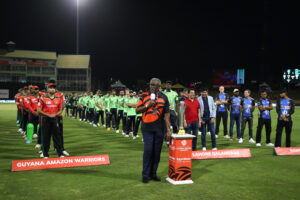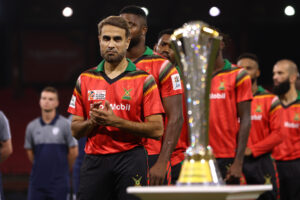
The world is coming to Guyana.
So says the marketing slogan of the inaugural Global Super League (GSL), an invitation-only, five-team T20 competition which started Tuesday night.
Only lasting 11 days, the tournament is unusually brief, with a ten-match group stage followed by a floodlit, Friday-night final at Providence Stadium in Georgetown.
It will be the first major T20 competition to unite teams from several different domestic and franchise leagues since the short-lived Abu Dhabi T20, and evokes the defunct Champions League (CLT20).
The catch?
None of the five teams – Hampshire, Lahore Qalandars, Rangpur Riders, Victoria, and hosts Guyana Amazon Warriors – are reigning champions at home.
The wider context that explains the GSL’s existence is that Guyana is in the midst of an oil boom.
Nine years ago, the US-based ExxonMobil discovered oil off the north coast, with reserves now estimated at the equivalent of 11 billion barrels; now, the International Monetary Fund ranks Guyana as the fastest-growing economy in the world – by far.

The upshot is a tournament designed to reflect the country’s ambition. “Guyana is the place to be,” Clive Lloyd, the league’s chairman, says.
“There are a lot of things in store here for cricket… I’m hoping that a lot more people will come to experience being in Guyana. There’s a lot to see and do, people are friendly, and the country is expanding.”
It was Mohammad Irfan Ali, Guyana’s president, who first publicly floated the concept of the GSL in April, and he unveiled the trophy last week during Indian prime minister Narendra Modi’s state visit.
Bobby Ramroop, the owner of the Guyana Amazon Warriors franchise, is heavily involved in the new league, and ExxonMobil is the title sponsor.
The Guyanese government is trying to position the country as a destination for sports tourism, and cricket is front and centre. It is investing heavily in the sector, with new facilities under construction.
Lloyd expects that a second cricket venue may be ready to host games in the second season of GSL, most likely in the Berbice region.

The GSL has faced criticism from climate activists as a “sportswashing vehicle” on account of its association with the oil giant.
The league’s argument is that by promoting tourism to Guyana, it will help the country diversify its economy and enable it to be less reliant on finite natural resources.
There is a significant prize pot of US$1 million for the winning team, and the hosts are clear favourites: they were runners-up in the recent CPL, have a strong historic record at home, and have the majority of their squad available.
That includes Gudakesh Motie, who is playing in the GSL rather than West Indies’ ongoing Test series against Bangladesh.
The other teams are missing key players: Lahore Qalandars are without their star names like Fakhar Zaman, Shaheen Afridi and Haris Rauf; Hampshire and Rangpur Riders have lost James Vince and Shakib Al Hasan respectively to the Abu Dhabi T10; and Victoria’s squad draws heavily on their Major League Cricket partnership with San Francisco Unicorns.
Each side is permitted to field up to five overseas players in its XI, and teams have made short-term signings to fill gaps in their squads – including several English players, who are available during their winter.
Darren Gough and Mickey Arthur are new coaches for Qalandars and Riders respectively. Arthur has also signed for the subsequent BPL.
The aim of the first season is primarily to provide proof of concept, with ambitions for a bigger tournament in 2025. “They’re trying to get more teams involved,” Lloyd says.
“The prize money is excellent: I’m sure that winning a million dollars is quite healthy… This first one is important to make sure that excited cricket is played, so people want to come back.”
The ten IPL franchises are conspicuous by their absence, though Hampshire’s involvement came about as a result of their recent buy-out by GMR Group, the co-owners of Delhi Capitals.
Lloyd believes an Indian team could be involved in the future: “I hope so. They have some exciting cricketers, and it’d be wonderful for them to come this far and display their talents.”
The GSL’s existence will prompt debate about the case for relaunching the CLT20, which was mothballed a decade ago, when broadcasters lost interest.
The franchise world has evolved significantly since with the emergence of the PSL, BPL, SA20, ILT20, MLC and the Hundred, and the “big three” boards held early discussions about the prospect earlier this year.
In practice, the GSL is unlikely to evolve into a full-fledged Champions League: it is all about Guyana, and would not function without Amazon Warriors’ involvement.
But Lloyd is confident that it will not be a flash in the pan: “I think it could be very successful. This could be something that lasts quite a while.” (ESPNcricinfo)











